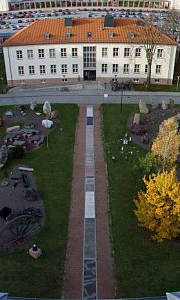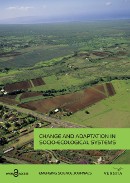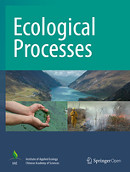Welcome
Forests are key ecosystems for the maintenance of biodiversity and the sustainable provision of ecosystem services. Still, there are many gaps in our understanding of the functional role of forests at ecosystem and landscape scales.
Our meeting theme, "The Green-Blue Nexus", addresses the conflict between provisioning services (the "Green"), such as timber / biomass and forest by-products (food and fodder) and regulating services (the "Blue") (e.g., cleaning drinking water, flood and erosion regulation) in relation to other impacts on biodiversity and the supporting structures and key ecological processes that enable the supply of these services.
We aim to address to what extent and how the status of any particular forest ecosystem and its temporal dynamics should be included in the overall assessment of ecosystems and their services at larger scales such as landscape scale. Such understanding is indispensable to adaptive management at multiple scales and the assessment of land use changes that might increase or decrease forest areas, including transitional states, and the availability of ecosystem services.
A relevant challenge in sustainably managing forests and forest landscapes is connecting and harmonizing the availability of multiple services for multiple actors at different scales. Worldwide increasing scarcity in water and natural resources, essential for human health, are creating conflicts with land uses, e.g., food and bioenergy production may result in illegal use of forest resources or large-scale deforestation. As another example, one-sided resource production goals are likely to destroy regulating capacities for water purification and disturb the landscape water-balance. On the other hand, there is a risk to demotivate small landholders by exaggerating protection goals for biodiversity and water quality, and thus accelerating the problem of mobilizing timber resources from all forest ownership types.
Consequently, we need to communicate at a policy-making level on the necessity of sustainable forest management standards and for the protection of forest areas; this requires nexus thinking that highlights the interdependencies among the manifold services that forests provide. In this context, landscape ecology as a discipline provides essential concepts and methods for a better understanding of a broad range of interdependencies between ecological structures and processes, at multiple scales, and how these are influenced by human decisions. New types of data and methods help develop better models of landscape dynamics that support decision makers in identifying the best set of adaptation pathways to global changes.
The conference will address particularly the topic "Green-Blue-Nexus in information society - supporting integrative forest management across scales and actors", while space will be conserved for other IUFRO LE and - as an interface to IALE - other landscape ecology relevant themes.
Our meeting theme, "The Green-Blue Nexus", addresses the conflict between provisioning services (the "Green"), such as timber / biomass and forest by-products (food and fodder) and regulating services (the "Blue") (e.g., cleaning drinking water, flood and erosion regulation) in relation to other impacts on biodiversity and the supporting structures and key ecological processes that enable the supply of these services.
We aim to address to what extent and how the status of any particular forest ecosystem and its temporal dynamics should be included in the overall assessment of ecosystems and their services at larger scales such as landscape scale. Such understanding is indispensable to adaptive management at multiple scales and the assessment of land use changes that might increase or decrease forest areas, including transitional states, and the availability of ecosystem services.
A relevant challenge in sustainably managing forests and forest landscapes is connecting and harmonizing the availability of multiple services for multiple actors at different scales. Worldwide increasing scarcity in water and natural resources, essential for human health, are creating conflicts with land uses, e.g., food and bioenergy production may result in illegal use of forest resources or large-scale deforestation. As another example, one-sided resource production goals are likely to destroy regulating capacities for water purification and disturb the landscape water-balance. On the other hand, there is a risk to demotivate small landholders by exaggerating protection goals for biodiversity and water quality, and thus accelerating the problem of mobilizing timber resources from all forest ownership types.
Consequently, we need to communicate at a policy-making level on the necessity of sustainable forest management standards and for the protection of forest areas; this requires nexus thinking that highlights the interdependencies among the manifold services that forests provide. In this context, landscape ecology as a discipline provides essential concepts and methods for a better understanding of a broad range of interdependencies between ecological structures and processes, at multiple scales, and how these are influenced by human decisions. New types of data and methods help develop better models of landscape dynamics that support decision makers in identifying the best set of adaptation pathways to global changes.
The conference will address particularly the topic "Green-Blue-Nexus in information society - supporting integrative forest management across scales and actors", while space will be conserved for other IUFRO LE and - as an interface to IALE - other landscape ecology relevant themes.














